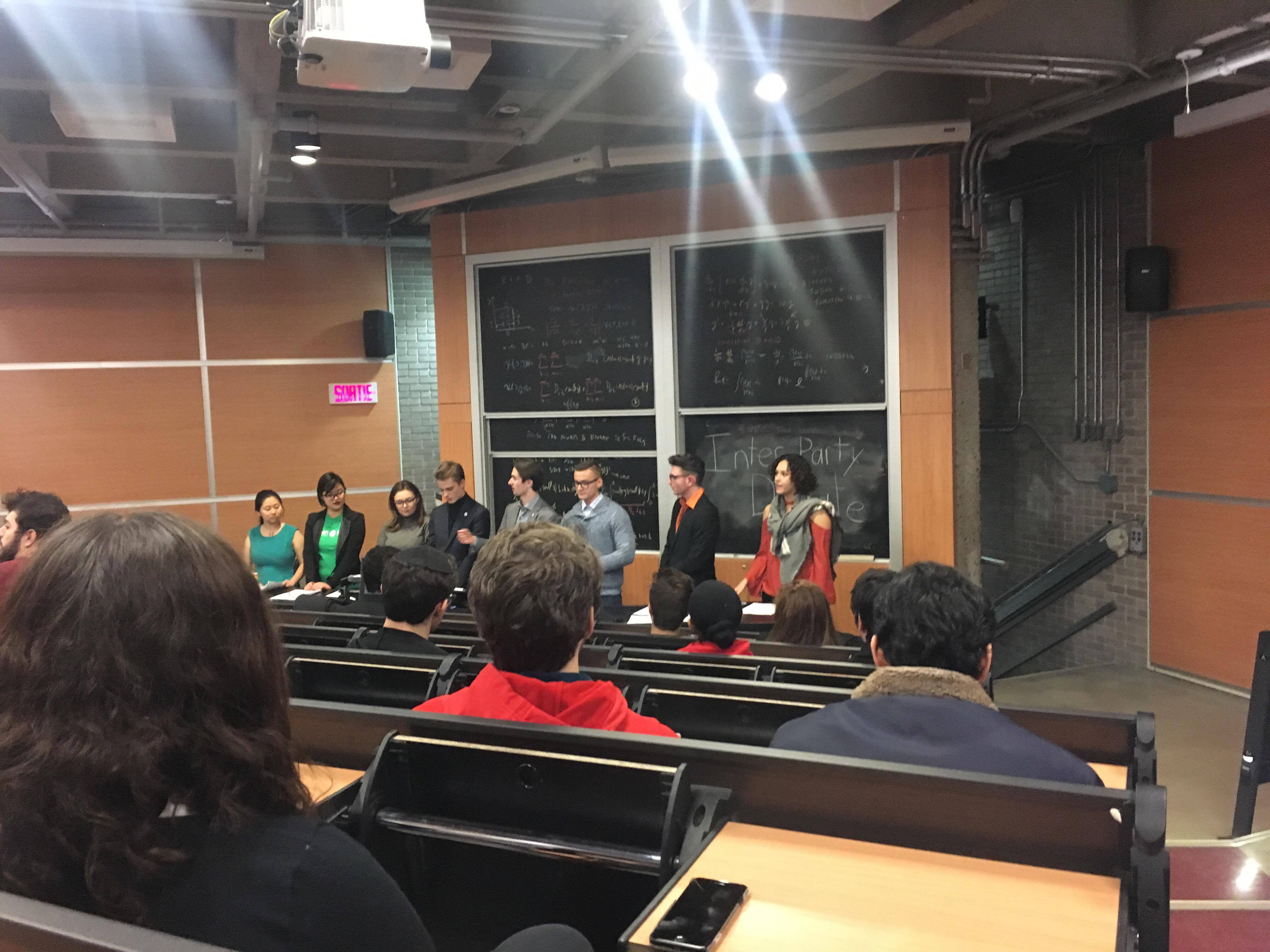On Nov. 21, the Political Science Students’ Association held a debate between the McGill chapters of Canadian political parties: Conservative McGill, Liberal McGill, New Democratic Party (NDP) McGill, and Young Greens McGill.
Representatives from these groups shared their views on drugs, immigration, Indigenous affairs, climate change, and economic policy. For each topic, representatives responded to prompts on how their parties address the presented issues, followed by a debate between the representatives. Arts Undergraduate Society (AUS) Legislative Council Speaker Husayn Jamal moderated the event.
The first part of the debate focused on drug policy—specifically on marijuana legalisation and the fentanyl crisis. Conservative McGill senior member Nikolas Dolmat argued that the legalisation of marijuana puts public safety at risk.
“The government is rushing marijuana legalisation despite the cries from scientists [and] law enforcement officials saying that there are not adequate harm reduction strategies in place,” Dolmat said during the debate. “We have ‘Mothers Against Drunk Driving,’ but what about ‘Mothers Against Dope Driving?’”
Unlike the Conservative Party, the NDP supports the legalisation of marijuana. NDP McGill member Kiana Saint-Macary cited Portugal's decriminalization of drug possession as an example of progressive drug legislation that she hopes will take form in Canada.
“We think that it’s inherent that the legalisation of marijuana is accompanied by the blanket pardon of past offenders,” Saint-Macary said. “We think the decriminalization of all drugs is particularly important because addiction is a health and social justice problem.”
During the immigration portion of the debate, students discussed the recent increase in Haitian immigration from the United States. According to NDP McGill member Josh Werber, it is crucial that Canada reevaluate the Canada-U.S. Safe Third Country Agreement.
“The current political situation in the United States is such that we must revise our immigration policies,” Werber said. “As tens of thousands of Haitian immigrants, who are lost without their temporary protection status, flee across the Canadian border, risking their lives, it is cruel for us to ignore their plight and apply this outdated agreement.”
The debaters also gave their parties’ perspectives on Indigenous affairs. Dolmat applauded former prime minister Stephen Harper’s reconciliation efforts, highlighting his official apology for residential schools in 2008. In response, Diamond Yao, U2 Arts and Science, a supporter of Young Greens McGill, said this was not enough. She referenced Amnesty International’s Stolen Sisters report, which details continued marginalization of Indigenous women that predated and followed Harper’s apology.
“It’s not enough to close down residential schools, because the oppression of Indigenous women is rooted in systemic oppression, such as social and economic marginalization,” Yao said. “This has pushed a disproportionate amount of Indigenous women into dangerous situations that include extreme poverty, homelessness, and prostitution.”
Debaters from all four groups agreed that the federal government must work toward mitigating the effects of climate change. Werber expressed disappointment in both the previous Conservative and current Liberal government in handling global warming.
“Despite being the 38th largest country by population, we’re the 10th largest emitter of carbon in the atmosphere,” Werber said. “Justin Trudeau went to [the] Paris [Summit] and came back with the same standards set by the Conservative government and that does not cut it.”
The final topic of debate was economic policy. Liberal McGill faced criticism from NDP McGill, Young Greens McGill, and Conservative McGill over the current Liberal government’s failure to support young Canadians and families. NDP McGill and Young Greens McGill recommended that the government increase social support and welfare for low-income Canadians, while Conservative McGill favoured increasing benefits for all Canadians. In response, Liberal McGill Director Jack Martin highlighted recent changes the Liberal government made to support these two groups.
“We increased the working income tax benefit very recently to make sure that we’re supporting working Canadians,” Martin said. “We just announced that we’re committing to build a hundred thousand social housing units, increasing childcare, [and] increasing homeless aid.”









